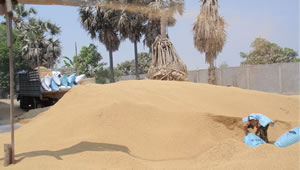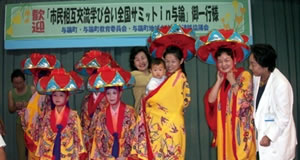Relay Column
Rice Husk Gasification Power Generation and the "Tri-benefit" Project

Rice husk from rice mills (Pursat Province, Cambodia)

General Environmental Technos Co., Ltd. is a comprehensive engineering company that encompasses the fields of environment, civil engineering, and architecture. Overseas, our endeavors have centered on environmental regeneration and restoration, renewable energy, and measures against global warming.
In Cambodia, we carried out a project to demonstrate an effective usage of the large quantities of husk that is generated by rice mills. Entrusted by the New Energy and Industrial Technology Development Organization (NEDO) in 2011, we jointly carried out the project with Yanmar Green System Co., Ltd. (YGS) for a period of three years. The government of Cambodia, which had been plagued by protracted civil warfare, was prioritizing agricultural development and promoting "development of the rice mill business and export of white rice." In our project, YGS introduced energy saving devices to rice mills that were then able to realize the following "tri-benefit," or threefold benefit:
- decrease in the use of light oil by replacing diesel in non-utility power generation with rice husk gasification;
- utilization of a by-product from rice husk gasification, carbonized rice husk, to enhance agricultural soils; and
- production of high-quality white rice for export with energy efficient rice mills.
We are contemplating utilizing the Joint Crediting Mechanism for the future expansion of this system.
More Information:
Creating Sustainable Futures through Regional Development

National Summit for Citizens' Mutual-Learning and Exchange (Yoron Island, Kagoshima)
To hand down a society in which future generations can live with a smile on their face, enthusiastic citizens, businesses and municipalities throughout Japan are actively engaged in the earnest challenge to create comfortable communities through collaboration.
We, GENKI Net, have been supporting progressive environmental activities across the country by hosting the " 'Genki(Vigor) Award' for Citizen-made Ecological Towns" since 2001.
Looking into the future, we hope to expand mutual learning on ecological community development (e.g. ecotourism exchange programs) into Asia through activities such as those of the Asia 3R Citizens' Network.
Characteristics of vigorous local environmental activities:
- Voluntary participation of many local citizens and coordination and collaboration with diverse entities
- Utilization of local resources such as nature, history and culture to solve local environmental issues
- Integrative activities that take diverse approaches including waste reduction, energy generation, and conservation
Characteristics of activities that endure over time:
- A focus on practical action and on the environmental learning and engagement of future generations
- Coordinating with experts (e.g. universities) for quality control
- Local vitalization through environmental business (e.g. by creating jobs and local products)
More Information:



